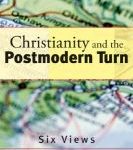Penner, Myron B., ed. Christianity and the Postmodern Turn. Brazos Press, 2005. ISBN: 1-58743-108-4.
Meet the Editor and Chapter Authors
Myron Penner, editor, is a professor of philosophy and theology at Prairie College and Graduate School.
R. Douglas Geivett is a professor of philosophy at Biola University.
R. Scott Smith is an associate professor of ethics at Biola University.
Kevin J. Vanhoozer is a research professor of systematic theology at Trinity Evangelical Divinity School.
John R. Franke is an associate professor of theology at Biblical Theological Seminary.
James K. A. Smith is an associate professor of philosophy at Calvin College.
Merold Westphal is a distinguished professor of philosophy at Fordham University.
About the Book
 The book opens with an introductory chapter by Penner outlining the postmodern turn, which is best understood as the linguistic turn. In part one, each author writes an essay about his understanding of the postmodern turn and its relation to the Christian faith. In part two, each author has an opportunity to interact with the content of all of the essays in part one and to expand or clarify his own arguments in light of those chapters. The essays make it clear the only common ground between the authors is that they are all Christian academics. Even a word as significant to the discussion as postmodern has a variety of meanings.
The book opens with an introductory chapter by Penner outlining the postmodern turn, which is best understood as the linguistic turn. In part one, each author writes an essay about his understanding of the postmodern turn and its relation to the Christian faith. In part two, each author has an opportunity to interact with the content of all of the essays in part one and to expand or clarify his own arguments in light of those chapters. The essays make it clear the only common ground between the authors is that they are all Christian academics. Even a word as significant to the discussion as postmodern has a variety of meanings.
Geivett and R. Scott Smith, the two Biola professors, find that postmodernism and Christianity cannot mix. Vanhoozer offers a middle ground that neither fully rejects nor completely embraces postmodernism as a possibility for Christianity. Franke, James K. A. Smith, and Westphal consider a variety of ways that postmodernity and Christianity can interrelate.
So What
Postmodernism is no longer a debate limited to the ivory tower; it is increasingly a fitting description of the dominant twenty-first century urban American culture. It is essential that Christians understand what postmodernism is and are able articulate the faith story in words that have meaning to postmodern people.
Part of the trouble in finding an agreed to definition of postmodernism is that the very venture of seeking a universally acceptable definition can quickly become a very modern undertaking. Postmodernism has begun and yet is not fully here nor fully formed. Christianity and more importantly Christian people must be willing not only to experience it, but to engage in authentic dialogue that continues to refine what Penner calls the postmodern turn.